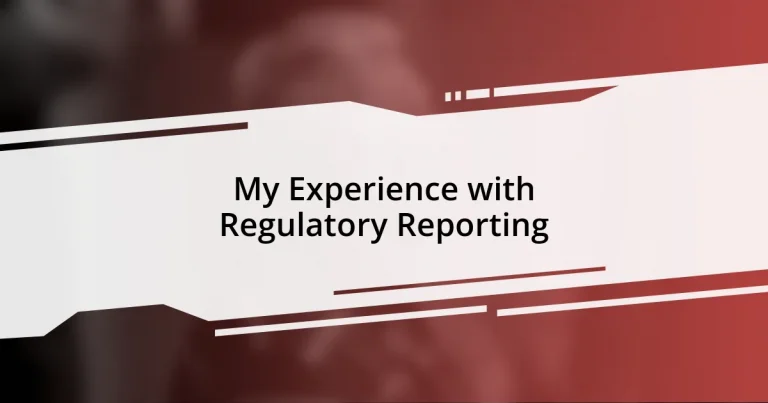Key takeaways:
- Regulatory reporting is essential for compliance, reflecting a company’s commitment to transparency and integrity.
- Maintaining regulatory compliance builds trust, enhances reputation, and mitigates risks, while non-compliance can lead to significant financial penalties.
- Utilizing the right tools, such as data analytics and automated reporting systems, can streamline processes and reduce errors in compliance tasks.
- Proactive communication, structured timelines, and continuous training are effective strategies for overcoming challenges in regulatory reporting.
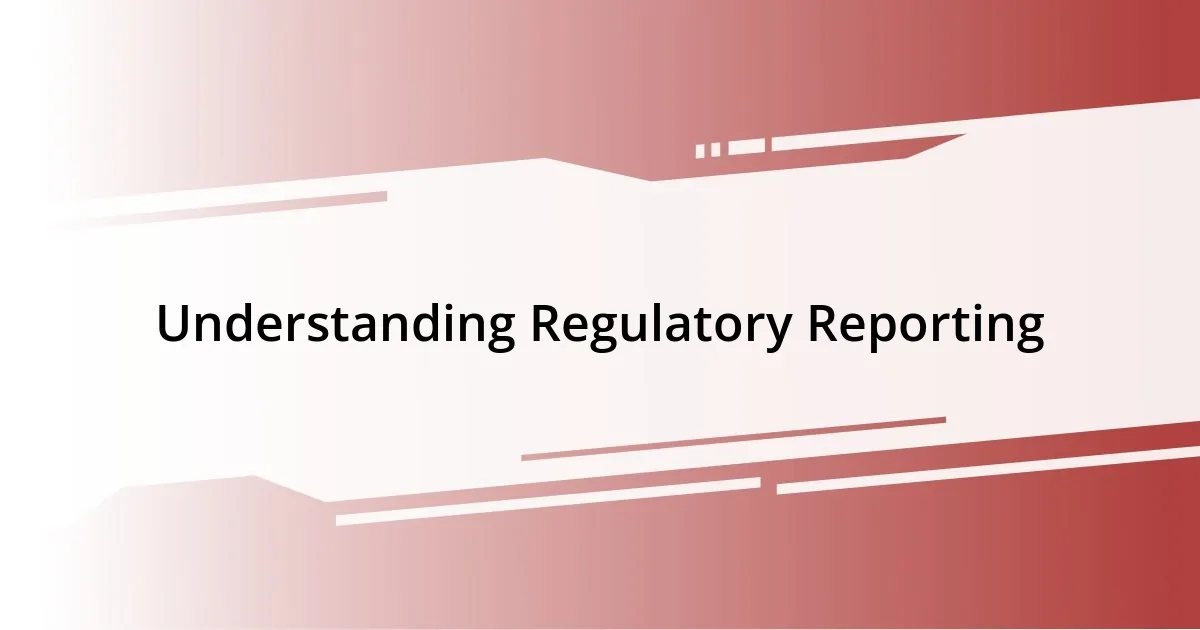
Understanding Regulatory Reporting
Regulatory reporting is a crucial part of compliance for businesses, especially in sectors like finance and healthcare. I remember the first time I tackled a regulatory report; the sheer amount of data required felt overwhelming. It often made me wonder—how can we ensure accuracy while also remaining compliant with ever-changing regulations?
The complexities of regulatory reporting can sometimes feel like navigating a labyrinth. I once spent hours sorting through financial records, trying to ensure every number aligned with the required formats. The pressure to get it right was palpable; it was more than just a report—it was our credibility on the line.
Understanding regulatory reporting means recognizing that it’s not just a routine task; it reflects a commitment to transparency and integrity. There are times when I’ve seen teams rally together, pouring their energies into meeting deadlines, and it reminded me how such reports can actually strengthen a company’s reputation. Have you ever felt that kind of collective effort in your work? It’s exhilarating when the pieces finally come together.
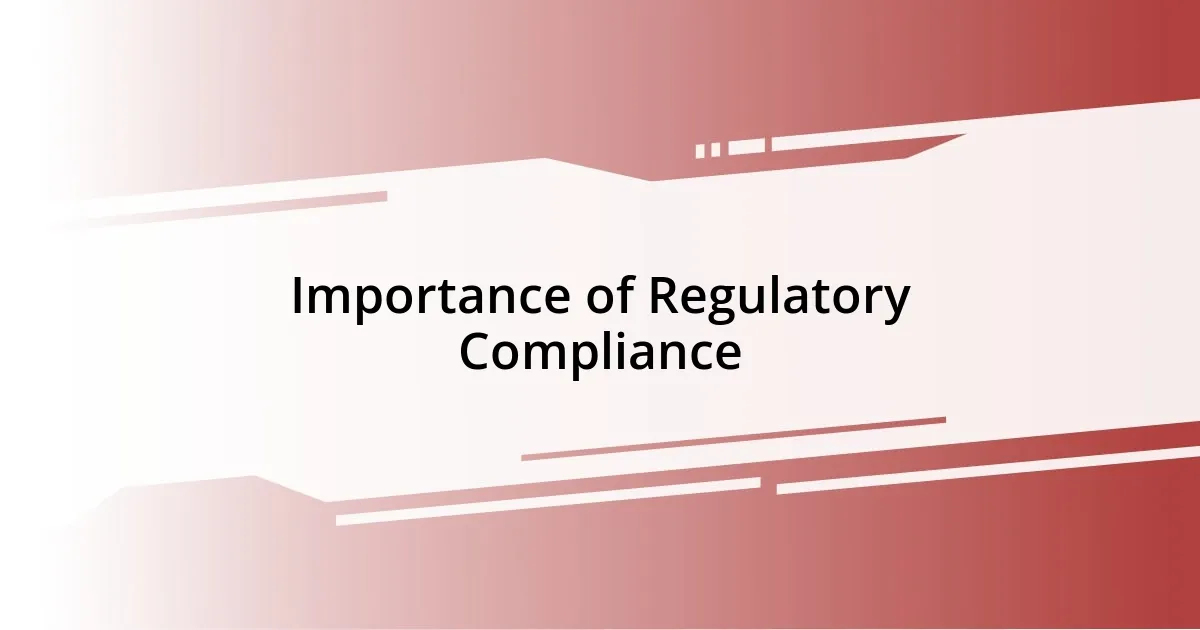
Importance of Regulatory Compliance
Regulatory compliance isn’t just a box to check; it’s vital for building trust. I recall a time when my team had to prepare for an audit. The dread hung in the air as we waited for the auditor’s feedback. That moment when everything was approved felt like a weight lifting off our shoulders—not just because we passed, but because we proved we were responsible stewards of the trust placed in us.
The significance of adhering to regulations can’t be overstated. Here’s why it matters:
- Reputation Management: Maintaining compliance fosters trust, enhancing a company’s reputation.
- Risk Mitigation: Adhering to regulations helps identify and mitigate potential risks before they escalate.
- Operational Efficiency: Streamlined compliance processes can lead to increased organizational efficiency and clarity.
- Financial Stability: Non-compliance can result in hefty fines or legal fees that jeopardize financial health.
- Market Positioning: Companies known for their compliance often gain a competitive edge in their industry.
Each of these factors contributes not just to compliance itself but to a culture of integrity and respect within the organization. It’s a journey, and I find that the commitment to compliance can truly empower teams to excel.
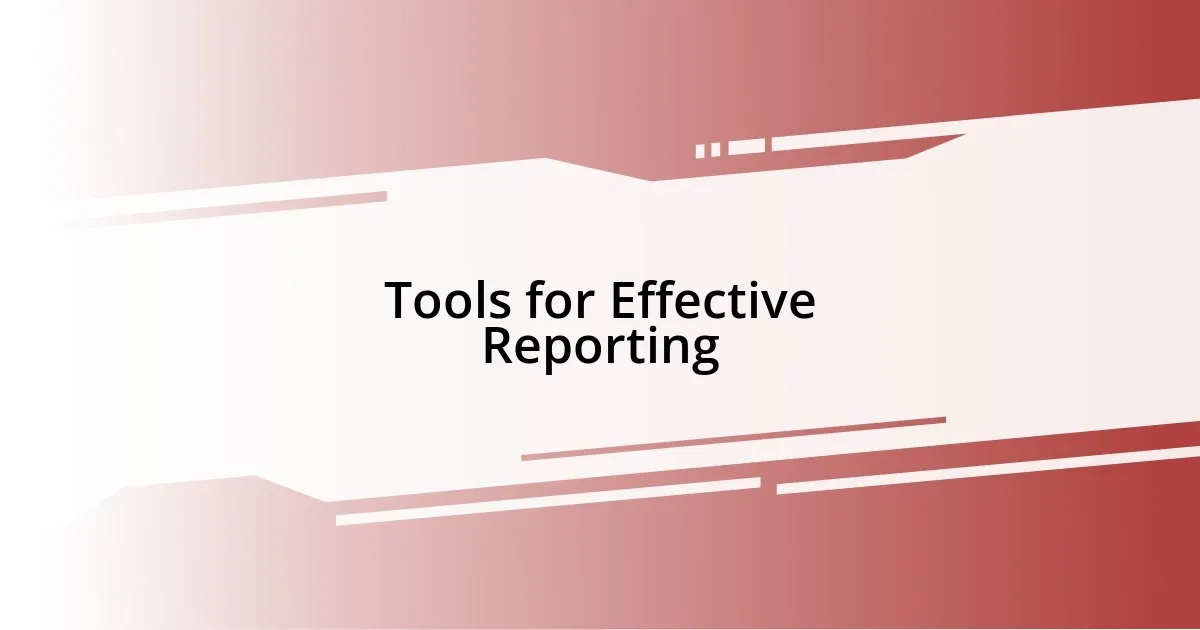
Tools for Effective Reporting
Selecting the right tools for effective reporting can make all the difference in streamlining the process. In my experience, adopting specialized software for regulatory reporting has significantly reduced the stress of compliance. For instance, using advanced data analytics tools allowed me to sift through complex datasets more efficiently, which led to more accurate reporting and fewer late nights at the office.
Having the right tools is like having a trusty map when navigating the regulatory landscape. I remember the first time I utilized a cloud-based reporting system; it was a game changer. The ability to collaborate in real-time with my team meant that we could catch discrepancies faster and provide updates on the fly. I can’t express how reassuring it felt to receive feedback almost instantly, transforming what once was a cumbersome task into a more fluid process.
Moreover, the integration of automated reporting tools has been pivotal in my work. These tools not only save time but also ensure consistent compliance check-lists are followed. As I witnessed the reduction in human errors over time, I felt a sense of relief wash over me, knowing that the tools not only supported our efficiency but also our commitment to accuracy.
| Tool | Benefits |
|---|---|
| Data Analytics Software | Enables efficient data handling and accurate reporting. |
| Cloud-Based Reporting Systems | Facilitates real-time collaboration and instant feedback. |
| Automated Reporting Tools | Reduces human error and ensures adherence to compliance check-lists. |
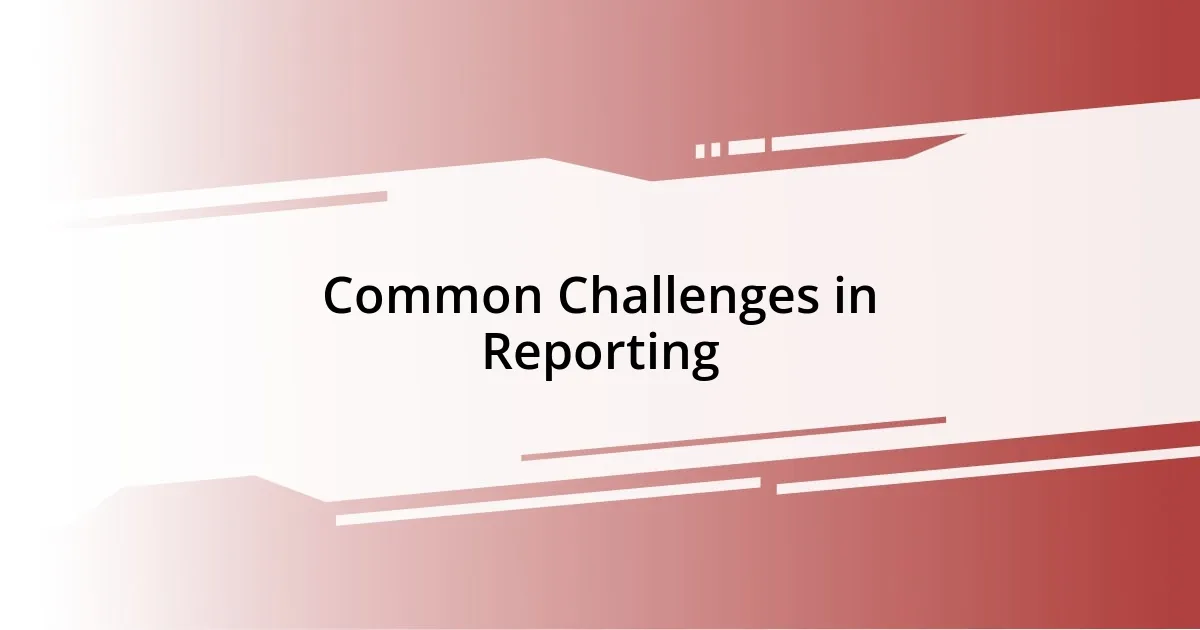
Common Challenges in Reporting
Common Challenges in Reporting
Navigating the complexities of regulatory reporting can be daunting. One of the most frustrating challenges I’ve faced is the sheer volume of data that needs to be processed. There were days when I felt buried under spreadsheets, struggling to verify each figure while grappling with looming deadlines. How do you extract meaningful insights from a mountain of numbers without losing your sanity? It’s a fine balance that can easily tip into chaos if not managed well.
Another significant hurdle is the ever-changing regulations. I remember a time when a sudden regulatory update left my team scrambling to adjust our reporting framework. It felt like we were in a race against time, trying to ensure compliance without compromising the quality of our work. This dynamic nature of compliance can send a wave of anxiety through the team—have we missed something critical? Are we prepared for the next surprise?
Additionally, the pressure to ensure accuracy is relentless. I recall a tense moment during a reporting cycle when a seemingly minor error was flagged at the last minute. The sense of dread was palpable as we worked tirelessly to rectify it. It wasn’t just about fixing the mistake; it was about maintaining trust with stakeholders. This experience reinforced the idea that even small details can have big implications—accountability and thoroughness are essential in our line of work.
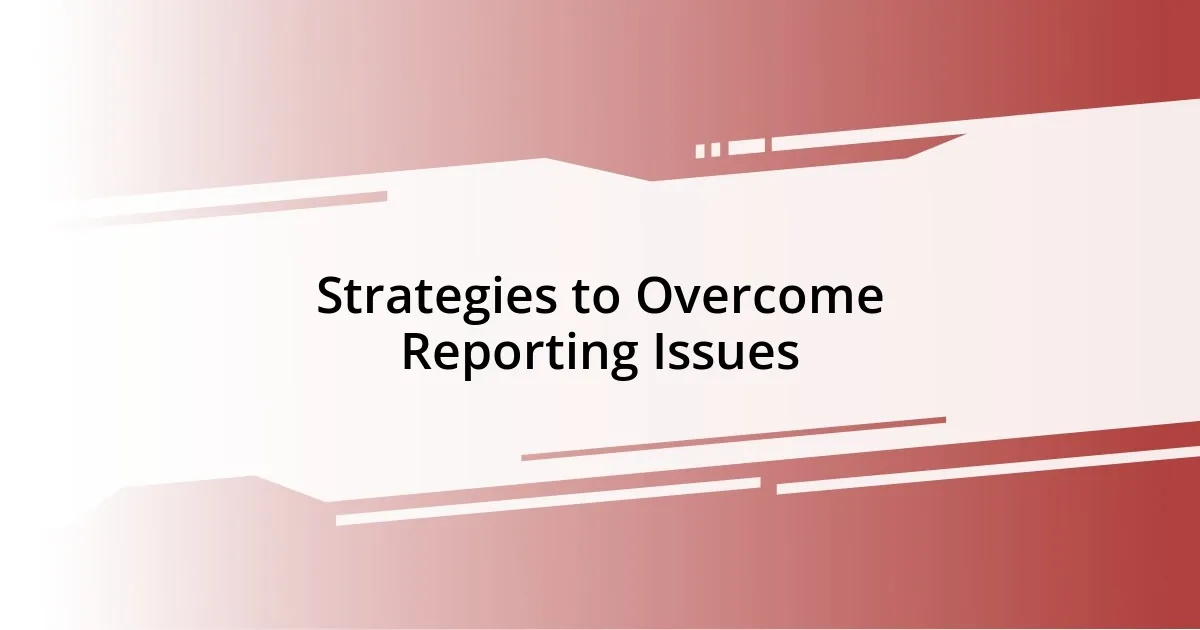
Strategies to Overcome Reporting Issues
When it came to overcoming reporting issues, I quickly realized the importance of proactive communication within my team. I recall a particularly stressful reporting period when clear lines of dialogue transformed our workflow. We established daily check-ins where everyone shared their progress and highlighted potential blockers. This approach not only alleviated tensions but also fostered a sense of camaraderie that helped us push through the toughest days.
Another strategy that stood out for me was creating a structured timeline with realistic milestones. I learned this lesson the hard way after missing key deadlines in the past. By breaking the reporting process into smaller, manageable tasks and assigning specific timelines to each, I noticed a remarkable shift in our productivity. It’s surprising how a simple timeline can serve as a motivating beacon, helping keep everyone accountable and focused on the end goal.
Lastly, I can’t stress enough the value of continuous training. There was a time when I felt overwhelmed by compliance shifts, and I invested in workshops for my team. The return on that investment was higher than I anticipated; new insights sparked innovative ideas, and everyone walked away feeling more confident. Isn’t it incredible how a little bit of knowledge can empower individuals to tackle challenges head-on? Embracing change through learning not only strengthens skills but also builds resilience in the face of uncertainty.
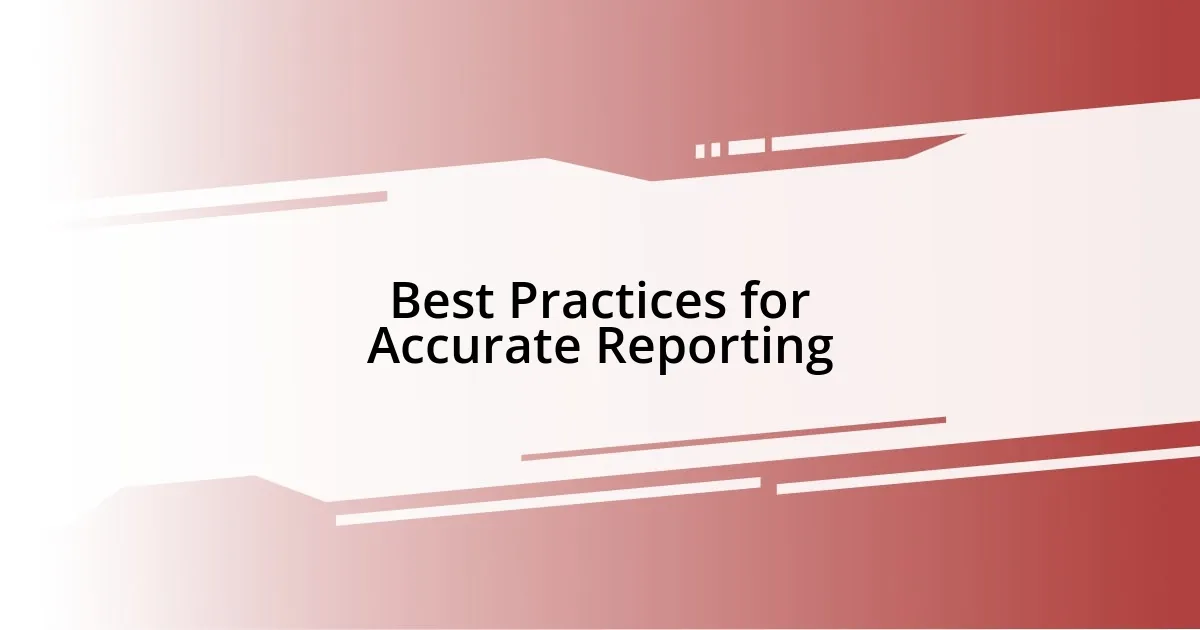
Best Practices for Accurate Reporting
One crucial best practice I’ve adopted for accurate reporting is meticulous data validation. Early in my career, I learned the hard way that neglecting this step could lead to significant errors. A colleague once missed a single bad data entry, which snowballed into a larger compliance issue. This experience taught me to prioritize a systematic review of every entry. After all, how can we build trust with stakeholders if we can’t trust our own numbers?
Another practice that’s been invaluable is maintaining clear documentation. I often found myself retracing my steps during audits, scrambling to piece together my thought process. Now, I ensure that every decision and change is documented, creating a clear history of reporting decisions. It also helps to have a shared archive where the entire team can access insights and modifications. Isn’t it reassuring to have a roadmap to reference when needed, rather than relying on memory alone?
Lastly, I’ve come to appreciate the power of collaborative reviews. In one memorable instance, my team and I implemented peer reviews before finalizing any report. This not only caught potential errors but also fostered a culture of support and reassurance. I discovered that having fresh eyes on our work often led to new perspectives and solutions. Why tackle a monumental task alone when a team effort can yield greater accuracy and confidence?
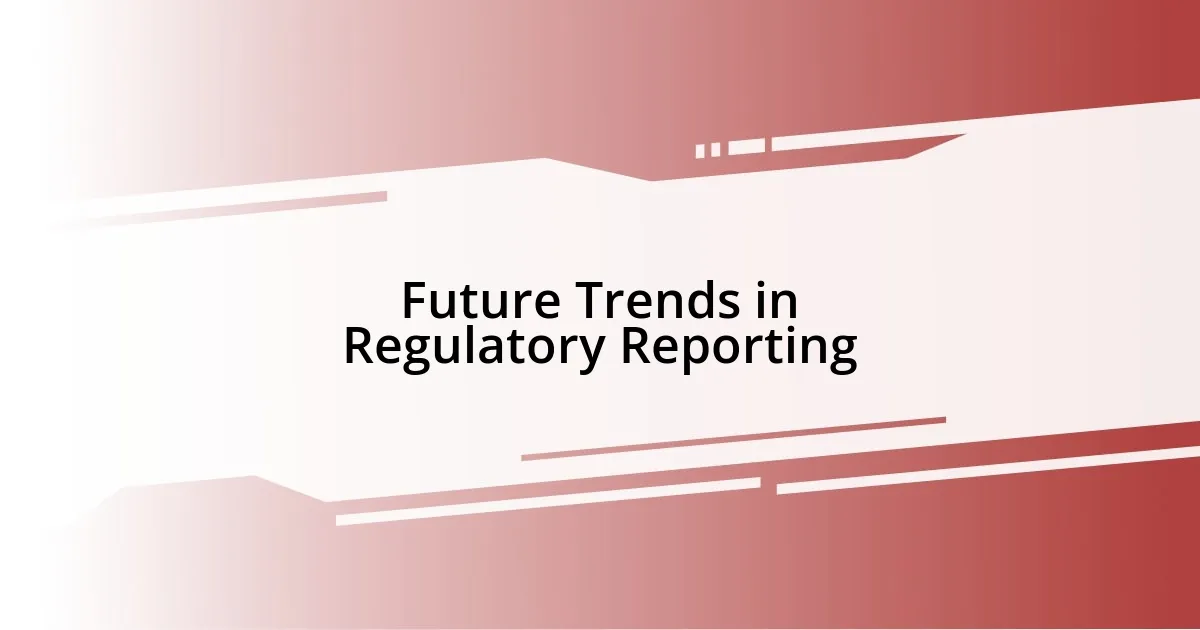
Future Trends in Regulatory Reporting
I’ve noticed that technology will play an increasingly critical role in shaping the future of regulatory reporting. For instance, I recently experimented with a regulatory reporting software that utilizes artificial intelligence (AI) to automate data collection and analysis. I was amazed at how quickly it flagged irregularities and generated reports, freeing my team to focus on strategic decision-making. Can you imagine how much more efficient our processes could become as these innovations continue to evolve?
As I look ahead, I can’t help but think about the importance of adaptability in our reporting practices. Regulatory landscapes are shifting rapidly, and I often find myself in conversations with colleagues about the need to be agile. I recall a time when a sudden update in regulations caught many of us off guard, but by fostering a culture of flexibility and open-mindedness in our teams, we can respond swiftly to changes. Isn’t it true that staying ahead means being ready to pivot when necessary?
Lastly, I believe that data sharing will become more collaborative across organizations and sectors. I recall a project where we partnered with another firm to enhance our reporting accuracy. This joint effort not only improved our data integrity but also solidified our relationships. It made me rethink the traditional silos in which we operate. What if we all embraced a more open data-sharing model? In my experience, this could lead to richer insights and ultimately elevate the quality of our reporting across the board.












